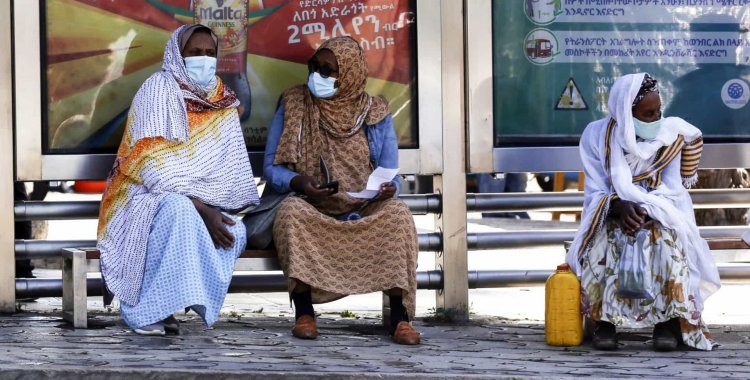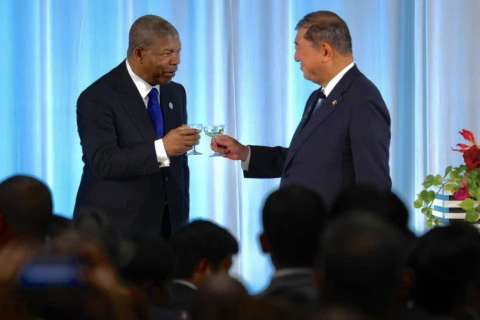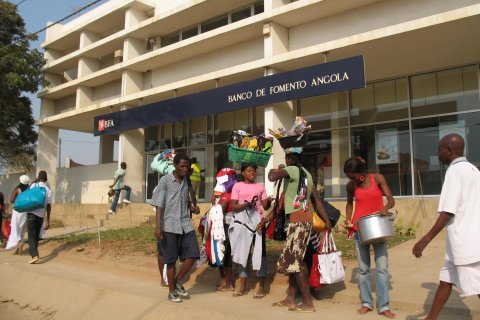The first case of covid-19 in Africa appeared in Egypt on February 14, 2020, and Nigeria was the first sub-Saharan African country to record cases of infection on February 28.
One year later, deaths associated with covid-19 in Africa increased by 40 percent between January and February and exceeded 100,000 at a time when the continent is grappling with new, more contagious strains and is in a race to get enough people vaccinated to prevent the virus from becoming endemic to the region.
The lethality rate of the virus continues to rise on the continent - during the second wave it reached 2.6 percent above the global average of 2.2 percent - despite a downward trend in new cases since early January.
Thirty-two countries reported an increase in deaths between January and February, and the covid-19 mortality rate in Africa during this period rose to 3.7 percent compared to 2.4 percent in the previous period.
Overall, February saw a 15 percent drop in new cases, according to data from the African Union Centre for Disease Prevention and Control (Africa CDC), a trend that changes in the regions of Central Africa, with a 14 percent increase in new cases, and East Africa, where new infections rose by 7 percent.
"These data may indicate the beginning of a third wave," warns Africa CDC director John Nkengasong.
African countries account for nearly 4 million cases of covid-19, or 3.4 percent of the world's total cases, and more than 100,000 deaths, which represent 4 percent of deaths caused by the disease worldwide.
Africa appears, however, as the second least affected continent by the pandemic, after Oceania, with 264.1 cases per 100,000 inhabitants and 67.1 deaths per million inhabitants, well below the world average of 1309.5 cases/100,000 inhabitants and 283.1 deaths/1 million inhabitants, according to data from the Robert Schuman Foundation.
North America is the most affected region (5058.3 cases/100,000 inhabitants and 1082.5 deaths/1 million inhabitants) followed by Europe (4021.7 cases/100,000 inhabitants and 931.2 deaths/1 million inhabitants).
Numbers that do not rest John Nkengasong, who insists on the need to avoid at all costs that Africa becomes a covid-19 endemic zone.
The Cameroon virologist, who has become the face of the fight against the covid-19 pandemic in Africa, does not hide his frustration with the "politically correct speeches" about solidarity and equitable access to vaccines and the inability to translate them into action.
Months behind Europe and the United States, this week several African countries began receiving the first vaccines under Covax, a mechanism driven by the World Health Organization (WHO) and the Vaccine Alliance (GAVI).
Ghana, Ivory Coast, Kenya, Angola, Gambia, Rwanda, Democratic Republic of Congo (DRCongo), Senegal, Nigeria, Lesotho and Sudan received the first doses in recent days.
Nkengasong recognizes the "symbolism" of the Covax mechanism's global cooperation and solidarity, but stresses that "it has always been very clear" that this mechanism would only give Africa 20 percent of the needed vaccines.
"And there is no way we can get rid of covid-19 with 20 percent vaccination, we need at least 60 percent. Europe is trying to vaccinate 80 percent. The United States is trying to vaccinate everybody. They will finish vaccinating, impose travel restrictions, and then Africa will become 'the covid continent,'" he said.
Therefore, several African countries are seeking vaccines through bilateral agreements with companies or donations, mostly with the Chinese state-owned pharmaceutical company Sinopharm.
Rwanda, which received two batches through the WHO and Gavi program (240,000 doses from AstraZeneca and 102,960 from Pfizer), had already started its vaccination campaign in mid-February after purchasing on its own about 1,000 doses of vaccines from Moderna and Pfizer.
In the same vein, Senegal received 324,000 doses from AstraZeneca through Covax, in addition to 200,000 doses from Sinopharm that allowed it to launch the immunization campaign on February 23.
Angola became the first Portuguese-speaking country to receive vaccines through Covax, with a first delivery of 624,000 doses, which are part of the total of 12.8 million planned.
In addition to these, the country has begun the process of acquiring 12 million doses of the Russian Sputnik V vaccine.
The African Union (AU), for its part, has secured 670 million doses of vaccine to be distributed in 2021 and 2022, and also has an offer from Russia of 300 million doses of Sputnik V, which will be available starting in May.
Although the arrival of the vaccines will enable the acceleration of covid-19 immunization in Africa, so far only 11 of the 55 African Union member states have started national vaccination campaigns: Morocco, Egypt, Mauritius, Algeria, Seychelles, Equatorial Guinea, Zimbabwe, South Africa, Senegal, Ivory Coast and Ghana.
The WHO regional director for Africa, Matshidiso Moeti, nevertheless estimates that "most African countries will have their vaccination programs in place by the end of March."







